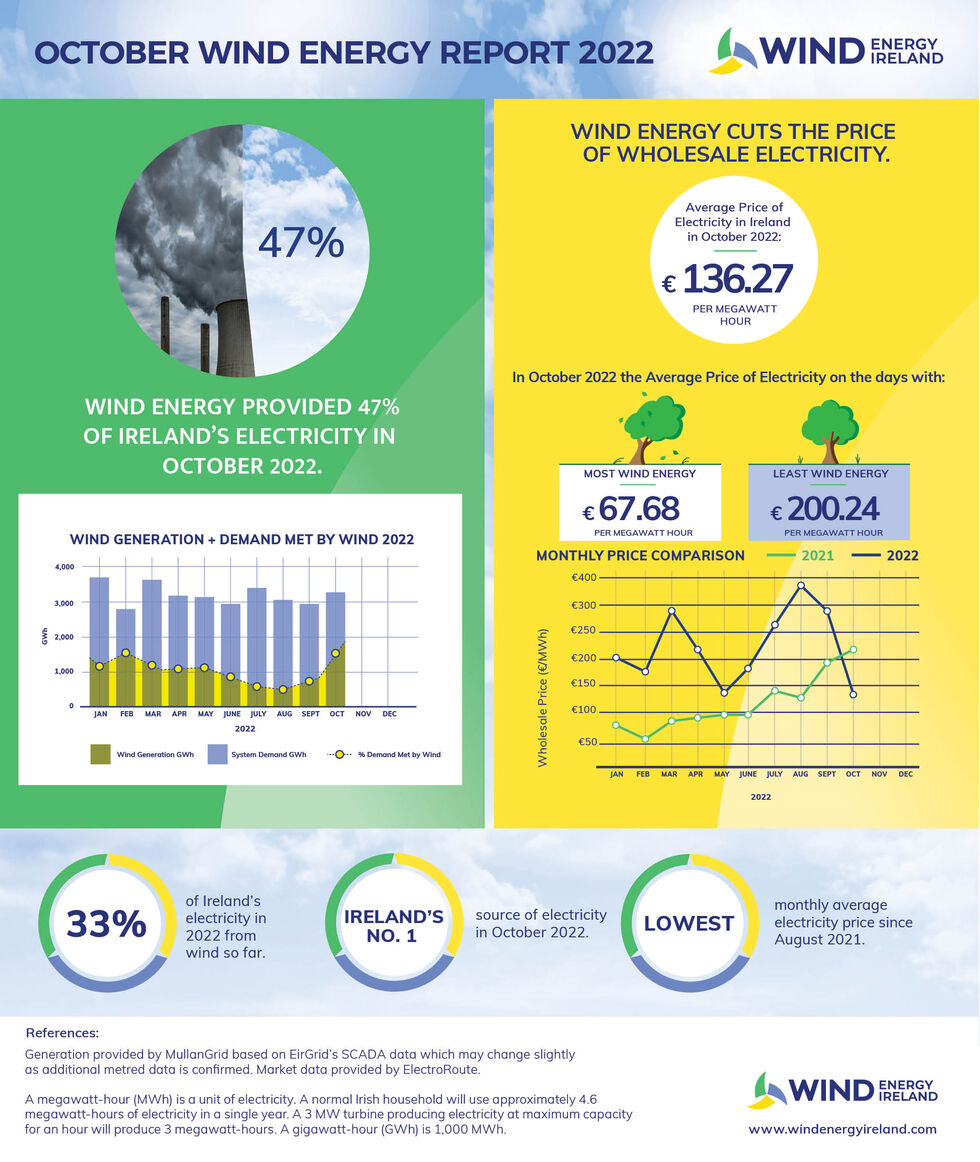Wind energy monthly report – nearly half of Ireland’s power provided last month
03 Nov 2022
Strongest ever October performance as wind energy pushes prices down
The October Wind Energy report shows that wind energy provided 47 per cent of Ireland’s electricity in October 2022, making it the country’s chief source of electricity last month.
The latest figures mean that wind energy has supplied 33 per cent of Ireland’s electricity demand this year to the end of October. This was the best October on record for the volume of electricity produced by Irish wind farms and the share of demand met by the country’s main source of renewable energy.
As the average wholesale electricity price fell to its lowest level since August 2021 the report emphasised again the contribution wind energy is making to insulating Irish families and businesses from the worst effects of the fossil-fuel energy crisis.
Noel Cunniffe, CEO of Wind Energy Ireland, said: “Ireland’s wind farms proved their worth again last month by continuing to help protect families and businesses from the worst effects of a crisis caused entirely by our reliance on the fossil fuels that are driving the climate emergency.
“Our members provided a third of the country’s electricity in the first ten months of the year. That is Irish generators producing power without burning imported fossil fuels, which means we can cut our carbon emissions at the same time as we cut our fuel imports.
“Ireland needs a clean, secure, supply of electricity and as we connect new wind farms ever year it will increasingly be wind energy which will provide it.”
Price of electricity
There was a dramatic fall in the average wholesale electricity price in the month of October as it dropped to €136.27 compared to the September figure of €283.25. This is the lowest average monthly price in more than a year. On the days with the most wind power on the system the average price fell even further to €67.68.
The large fall in wholesale electricity prices was due to the combined effect of large volumes of wind energy on the system reducing the need for gas and a steep drop in European gas prices as unreasonably mild weather across the continent caused a fall in demand.
Noel Cunniffe continued: “Irish electricity consumers are on the front line of the current energy crisis. While the drop in prices last month is welcome there is a long way to go before we see the impact on the consumers’ bills.
“Long-term electricity prices in the first half of next year are still very high which reflects the belief in the market that the price of gas will rise again as the weather turns colder and European gas storage levels start to fall.
“Our families, communities and businesses will be vulnerable to extreme electricity prices so long as we continue to rely on imported fossil fuels for our power. We must accelerate the development of our own, indigenous, sources of renewable energy to meet our carbon emissions targets and to protect consumers.”
Total electricity demand in October 2022 was 3,222 gigawatt-hours (GWh) of power and wind energy generated 1,522 GWh. Demand in October 2021 was 3,258 GWh and wind produced 1,141 GWh that month.
The results of this report are based on EirGrid’s SCADA data compiled by MullanGrid and on market data provided by ElectroRoute. This is the tenth in what will be a continuing series of monthly reports from Wind Energy Ireland. This series will play an important role in informing the development of wind energy in Ireland.
ENDS
Note: A megawatt-hour (MWh) is a unit of electricity. A normal Irish household will use approximately 4.6 megawatt-hours of electricity in a single year. A 3 MW turbine producing electricity at maximum capacity for an hour will produce 3 megawatt-hours. A gigawatt-hour (GWh) is 1,000 MWh.







